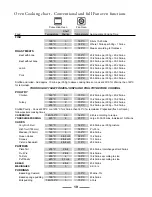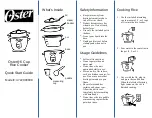
4
The Hob
When you cook on a ceramic hob its very
important to use the right sort of pans...
1
Use only pans that are suitable for ceramic hobs.
We recommend stainless steel and enamelled
steel pans because pots and pans with copper or
aluminium bases leave traces on the hob that are
diffi cult to remove.
Glass-ceramic cookware is not suitable because of its
poor conductivity.
2
Pots and pans should have thick, smooth, fl at bottoms.
This ensures that there is the maximum heat transfer from
the hob to the pan, making cooking quick and energy
effi cient.
Never use a round bottomed Wok even with a stand.
3
The very best pans have bases that are very slightly
curved in when cold. If you hold a ruler across the bottom
you will see a small gap in the middle. When they heat up
the metal expands and lies fl at on the cooking surface.
Make sure that the base of the pan is clean and dry to
prevent any residue burning onto the hob panel. This
also helps prevent scratches and deposits (such as lime
specks).
4
Always use pans that are the same size as (or slightly
larger than) the areas marked on the hob top. Using
smaller pans wastes heat, and any spillage will be burnt
on. Using a lid will help the contents boil more quickly.
5
Always lift pans off the hob. Sliding pans may cause
marks and scratches. Always turn the control to the off
position before removing a pan.
6
There are indicator lights for each of the cooking areas.
These come on when a hob control is turned on and
stay lit while the surface cools. Always take care before
touching the surface even when it is turned off - it may be
hotter than you think.
7
The ratings of the cooking areas are shown on the
diagram above.
8
Although the ceramic surface is very strong, a heavy or
sharp falling object (a salt cellar for example) might cause
the surface to crack. If you fi nd a crack in the surface
immediately disconnect the appliance from the supply
and arrange for its repair.
Care should be taken that no water seeps into the
appliance.





































